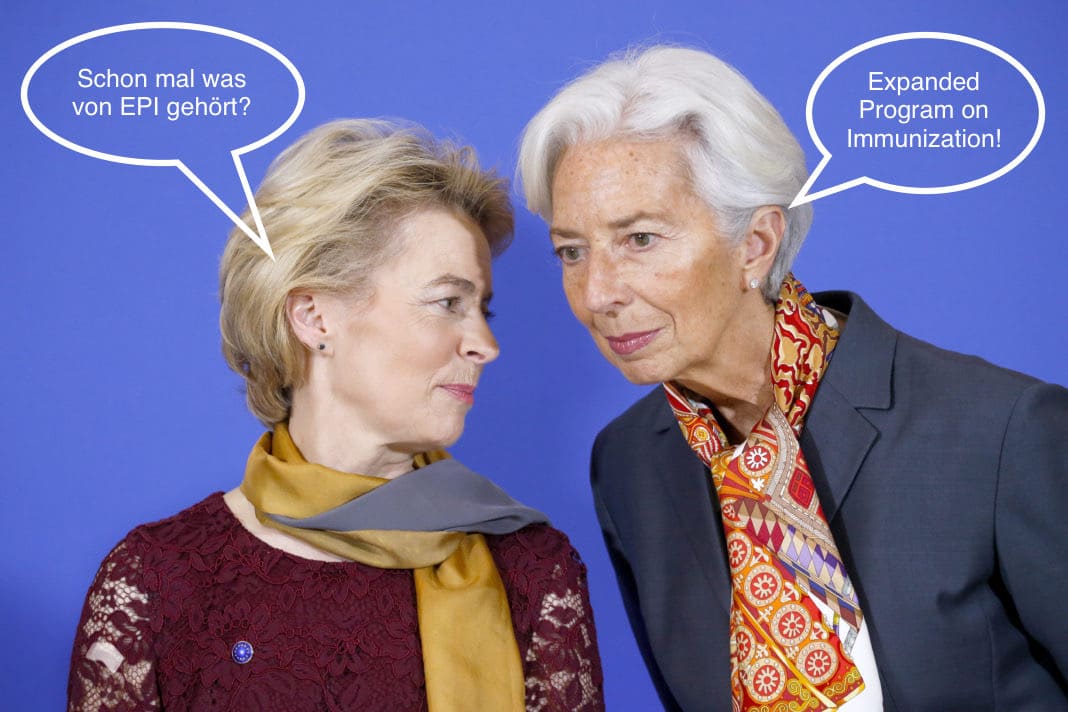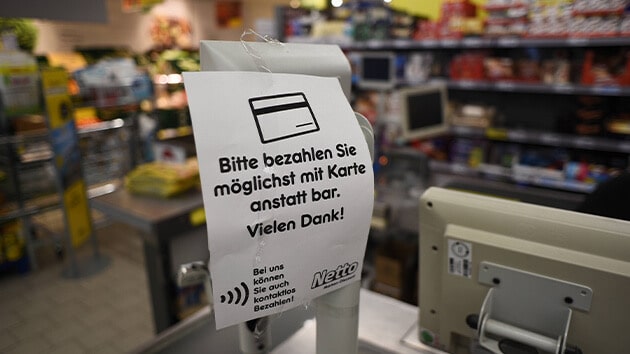An article by Marcus W. Mosen
The banks in Europe and Germany are certainly not bored at the moment. And with the corona virus, a new challenge is now being added: many projects that until recently were considered of the highest strategic importance could now lose importance thanks to corona.
Just a few weeks ago, many industry representatives were still convinced that cashless payment transactions were a business-critical priority for banks and Sparkassen. Since last summer, the German banking industry has been pursuing a joint project under the name „X-Pay“ with the aim of making its cashless payment products more sustainable.

Essentially, it´s a question of the „Girocard“, still better known as the Ec-card, the online payment options „Paydirekt“ and „GiroPay“, as well as „Kwitt“, which enables payments to be made from person to person. Parallel to „X-Pay“, the „EPI“ (European Payment Initiative) project is running. In this initiative, 21 European banks have joined forces with the aim of creating a framework for a new European payment system. Banks from Germany and France, in particular, are at the forefront of this initiative, which is receiving political support from the EU Commission and the ECB and, on the German side, from the Bundesbank and the Federal Ministry of Finance.
Alternative European payment scheme
The current timetable of both initiatives provides for fundamental decisions to be taken in the coming days and weeks as to whether and how these two projects will be taken forward. The parties involved on the German side are well aware that the product hodgepodge and the diverging interests within the „three pillars of the banking industry“ would have to be cleared up if they wanted to have any chance at all to counter the BigTech companies with something marketable in payment transactions. The political stakeholders are also prepared to support banks and Sparkassen in their efforts to counter the payment giants Mastercard, Visa and Paypal with an alternative European payment scheme.
The baseline in the German financial industry is a difficult one compared with other European countries. This is because issuing debit and credit cards to their customers has never really been a core business of banks in Germany, and cashless payment transactions have therefore not really been in the focus of the management boards of German banks.

The mediation of card acceptance and the leasing of POS-terminals by „acquirers“ to retailers was also considered a „commodity“ service, which banks at best outsourced to subsidiaries. In both areas of cashless payment transactions, therefore, there has been little investment in recent years. Compared to other international providers, the acquirers were too small and/or were not financially equipped to play an active role in the consolidation taking place at European level.
As a result, all German acquirers have been sold in the last 10 years – exclusively to foreign payment companies or private equity companies. As a result, the German financial industry has hardly any influence on the payment business in retail. This ecosystem is today dominated by internationally positioned companies such as Worldline, Nets, Wirecard or Adyen.
On the card-issuing side, people in Germany have for a long time only relied on the Girocard. The argument: everyone who has a Giro account has it in their wallet. The disadvantage: it can still only be used at the POS, but not in online trade. Thanks to the upgrade of POS terminals with the possibility of contactless payment, Girocard achieved transaction growth of almost 20% last year. Girocard thus moved to the center of considerations in the „X-Pay“ project.

Even Paypal’s competitor product „Paydirekt“, which was introduced in 2015 and has so far met with little interest from retailers and consumers, will probably have to be integrated into a future product consolidation. This quite sensible step would offer the opportunity to create a payment solution that would be accepted at the POS and in online trade.
In an age of fluid boundaries between these trade channels, this is the essential requirement for every payment system!
Retail: Cash acceptance will continue to decline
In 2018 many bank board members suddenly realized that payment is perhaps not just a commodity after all. At that time, Wirecard pushed Commerzbank out of the DAX and the Dutch payment services provider Adyen had a brilliant initial public offering. Both companies each have a market capitalization in the double-digit billion range.
The next „wake-up call“ was the introduction of Google Pay and Apple Pay, also in 2018. Mobile payment was also not a high priority for German banks and Sparkassen and many bankers did not want to believe in the success of Apple Pay in particular, for a long time. But at the latest since companies such as PayPal, Apple, Facebook or Google have been associated not only with payment services, but increasingly with other financial services as well, it is now clear to all bankers, that payment is a central function and service for both commercial and private customers.
And because of Corona, the acceptance of cash in retail will continue to decline. There is currently hardly a discounter that does not actively encourage contactless payment with cards or smartphones for reasons of hygiene. Cash is already in a „declining curve“ in retail, because customers and sales staff find contactless payment a relief. And for every cashless transaction, card issuers, acquirers and the respective card scheme earn a small amount. A turnover potential that banks are reluctant to forego in an age of low interest rates. The two initiatives „X-Pay“ and „EPI“ are therefore coming at the right moment.
Huge competition
But also, the American credit card companies, MasterCard and Visa, have not been idle in recent years either. With their rules and regulations, they have implemented NFC technology, which is the key to contactless payment. They have also underpinned their strategic growth plans in Europe with acquisitions and targeted investments in Fintechs. They are following the „EPI“ project with suspicious eyes, because it is not only intended to be an alternative to the two payment giants, but perhaps even to push them back in the final stage.
But is that realistic? This is the question that the top representatives of banks, the ECB, national currency watchdogs and governments want to decide in the next few days. Eight years ago, a similar project called „Monnet“ failed, probably also because it was not supported by the top representatives of the banks, governments and the EU Commission. This is now different: even the CEOs of German banks, the heads of the ECB and the Bundesbank are now familiar with „EPI“. And politically it has the support of the Federal Chancellery and the Elysee Palace. This is really remarkable, because obviously many people are aware that otherwise European digital payment traffic will increasingly take place on the global platforms from America.

And since digital payment is a fundamental function in any ecosystem, national payment systems in Europe will not play a relevant role in other industries, such as the digital platforms of the car industry. It is obvious that European banks would only play secondary roles in these business areas.
Challenges of the future
The questions that the decision-makers now have to answer are not trivial. After all, a new European payment system will not only swallow billions in development and marketing but established national payment solutions and infrastructures would presumably have to be discontinued or at some point brought into European governance. The decision on the consolidation of companies and infrastructures is now also pending in the „X-Pay“ project. It will have to be shown here whether decisions are not made on the basis of political compromises.
A sustainable payment solution should be based on the principles of industrial logic, i.e. derive its competitiveness and future viability from the added value for customers and merchants. A medium-term integration of a consolidated Girocard system into a European solution would not only be desirable, but even mandatory. After all, in many shopping situations or when travelling abroad, consumers can no longer be made to understand that they have to use different solutions for payment.
It is questionable whether, after the economic crisis associated with Corona, the banks and Sparkassen still have the motivation to invest high triple-digit million amounts in payment transactions. The political decision-makers should now take on a greater share of responsibility that goes beyond mere political declarations of intent. Financing the „EPI“ project by, for example, the European Union would have the advantage of creating an open payment ecosystem in Europe, in which not only banks but also Fintechs or technology start-ups with new applications could participate.
„The political decision-makers should now take on a greater share of responsibility that goes beyond mere political declarations of intent.“
A payment traffic platform that is defined and operated only by traditional structures has rather little chance of differentiating itself from global competition. This is because there is a danger that once again, action will be taken on the lowest common denominator, or that only an alternative to Mastercard and Visa will be the guidelines for the decision-makers objectives. Then another „Monnet“ threatens…
To the writer:
Marcus W. Mosen, baby boomer from the top year, comments on payment or banking topics at Finanz-Szene.de and delights his followers on twitter (@mwmosen) with pointed contributions on payment, fintech or politics. After studying business administration in Koblenz and Birmingham, Mosen started his career at the Treuhandanstalt in Berlin and a telecommunications company in Düsseldorf. Since 1999, he has been actively involved in shaping the development of cashless payment transactions, at various points of contact, in the German and European payment industry.






